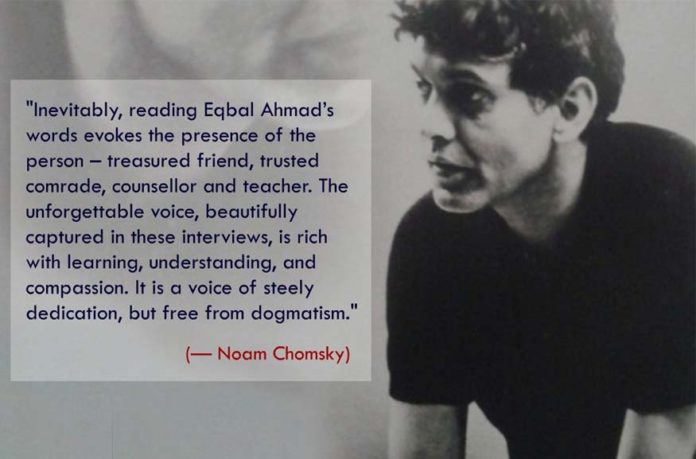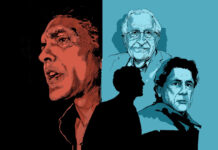Home Articles Eqbal Ahmad: A Public Intellectual with a Global Vision
Disclaimer: The Eqbal Ahmad Centre for Public Education (EACPE) encourages critical and independent thinking and believes in a free expression of one’s opinion. However, the views expressed in contributed articles are solely those of their respective authors and do not necessarily reflect the position or policy of the EACPE. You can contribute your writings at newsletter@eacpe.org
Twenty years back on 11th May, South Asia’s top public intellectual Eqbal Ahmed passed away due to heart attack. He died after surgery of colon cancer from which he was suffering. Eqbal was not only a public intellectual but an academician, activist, author, writer, political analyst and an active participant of global left movement. As renowned American historian, writer Howard Zinn writes about him: “He was not an armchair analyst, but a participant in some of the most important struggles of our time in Algeria, in Vietnam, in Palestine. He was never bound by a single ideology, always committed to social justice and nonviolence. In short, an exemplary human being.” He was a rare public intellectual who himself fought for oppressed people and their struggles. He was a gramscian and a socialist, democrat in his own words. He was close friends and had close association with top intellectuals of the time like Frantz Fanon, Noam Chomsky, Edward Said, David Dellinger, Howard Zinn, Ibrahim Abu Lughod, Faiz Ahmad Faiz, Agha Shahid Ali and many others.
Eqbal had a deep vision and eye. He predicted future events which later proved true. For instance, he predicted Iraq invasion and Arab uprising long back as well as he gave reasons for economic and strategic interests in the Middle East. He had eye on Middle East since his Phd days as his topic was on Tunusian-Morrocon trade unions. He warned about newer forms of imperialism in the form of American imperialism. He was one of most vocal critics of US foreign policies and hegemony. He was of the opinion that USA had poisoned seeds in Middle East and South Asia. Edward Said, his close friend, public intellectual and founder of Post Colonial studies, called him “the shrewdest and most original anti-imperialist analyst of the post-war world, especially in the dynamics between the West and the post-colonial states of Asia and Africa.” His writings on anti-colonial struggles, revolutionary uprisings and Western Imperialism are still considered important. He was even arrested on Jan 1971 for allegedly kidnapping president Richard Nixon’s National Security Adviser Henry Kissinger and blow up the heating system of severalbuildings, a mistrial from which he was acquitted after fourteen months and was said to have been falsely arrested for being vocal critic of US policies and hegemony.
He was among the first Pakistani fighters in Kashmir in 1947, though later he realized that a military solution was just not possible.
Eqbal had critical solidarity with Algeria’s National Liberation Front and Palestinian’s Palestinian Liberation Organisation. He even was vocal against Bosnian ethnic cleansing. He met a wide range of activists like Yasser Arafat and Afghan Mujahideen pioneers like Osama Bin Laden. He was of the opinion that Islamic radicalism can be curbed by free and fair election, end of wrong policies and dictatorship. In 1998, he gave a brilliant talk at University Of Colorado on “Terrorism: theirs and ours” by demystifying the mainstream and popular notion of terrorism.
He was among the first Pakistani fighters in Kashmir in 1947, though later he realized that a military solution was just not possible. His close friend Stuart Schaar has written a book on him “Eqbal Ahmad: Critical Outsider in a Turbulent Age” published by Cambridge University Press. It discusses in detail about his fight in Kashmir’s first war based on his interview with his daughter Dohra. Eqbal, just 14 years old at that time, was recruited by Muslim Leaguers for Kashmir war from his school. Besides Muslims Leaguers, there were two other groups – Ahmadis and communists led by Latif Afghani – who introduced Eqbal to leftist ideology. Eqbal extensively wrote on Kashmir. In his essay “A Kashmiri Solution for Kashmir“, he writes that Kashmir is not a communal problem and that the dispute can’t be resolved by disregarding aspirations of Kashmir’s people. Nehru’s broken promise and manipulation of Kashmiris not only by India but by Pakistani too added to the problem. He writes about Ghulam Mohammed’s betrayal of Kashmiris when Sardar Patel offered him Kashmir for Hyderabad which he declined. One of last writings of his life was on Kashmir named “Kashmir and its Challenges” which was published on 31st January,1999. In this article he writes about Kashmir’s indigenous movement and its unusual power. He was of the opinion that Kashmir dispute can’t be solved militarily but by dialogue, taking Kashmiri aspirations in consideration. In his opinion decades of misrule and repression started uprising in Kashmir. He wanted to promote dialogue to end this bloody and expensive conflict as both India and Pakistan possess nuclear weapon. Eqbal was joined with physicists Abdul Hameed Nayyar and Pervez Hoodbhoy who too are against nuclear folly and are carrying his vision forward.
He wrote extensively on South Asia post Partition. He believed partition didn’t solve problems it aimed. Bengalis supported partition but felt alienated in post partition era. Uprisings in East Pakistan, Punjab and Kashmir are witness to it.
He was of the opinion that Islamic radicalism can be curbed by free and fair election, end of wrong policies and dictatorship.
Eqbal was critical of Pakistani leaders’ policies. He was critical of Bhuttos, Zia, Nawaz and others. He had high opinion about founder of Pakistan Mohammad Ali Jinnah. He saw him as a great liberal, visionary whose opponents of pre-partition era became heroes later when Pakistan came into being. He called Zulfiqar Ali Bhutto mass rhetorician, who was dedicated to himself and not to people. He called Zia’s era as dark. Eqbal at the end of his life wanted to establish a liberal arts university named “Khaldunia” which Benazir Bhutto didn’t allow to build due of his criticism to her and her father’s policies and alleged corruption. Later polo ground was build on the allotted field. His dream of Khaldunia is still unfulfilled, which is a sad tragedy not only for Pakistan but whole South Asia. As Arundhati Roy wrote about him: “Eqbal Ahmad is a brilliant man with brilliant insights. My only complaint about him is that he is not here now, when we need him most.”
South Asia is in dire need of visionary people and peacemakers like Eqbal Ahmad.
A contributed article by Faizaan Bhat.








A Nice, informativ article about an eminent scholar.
His desire to build « khaldunya» must be fulfiled by those who are his admirers and patriotic.